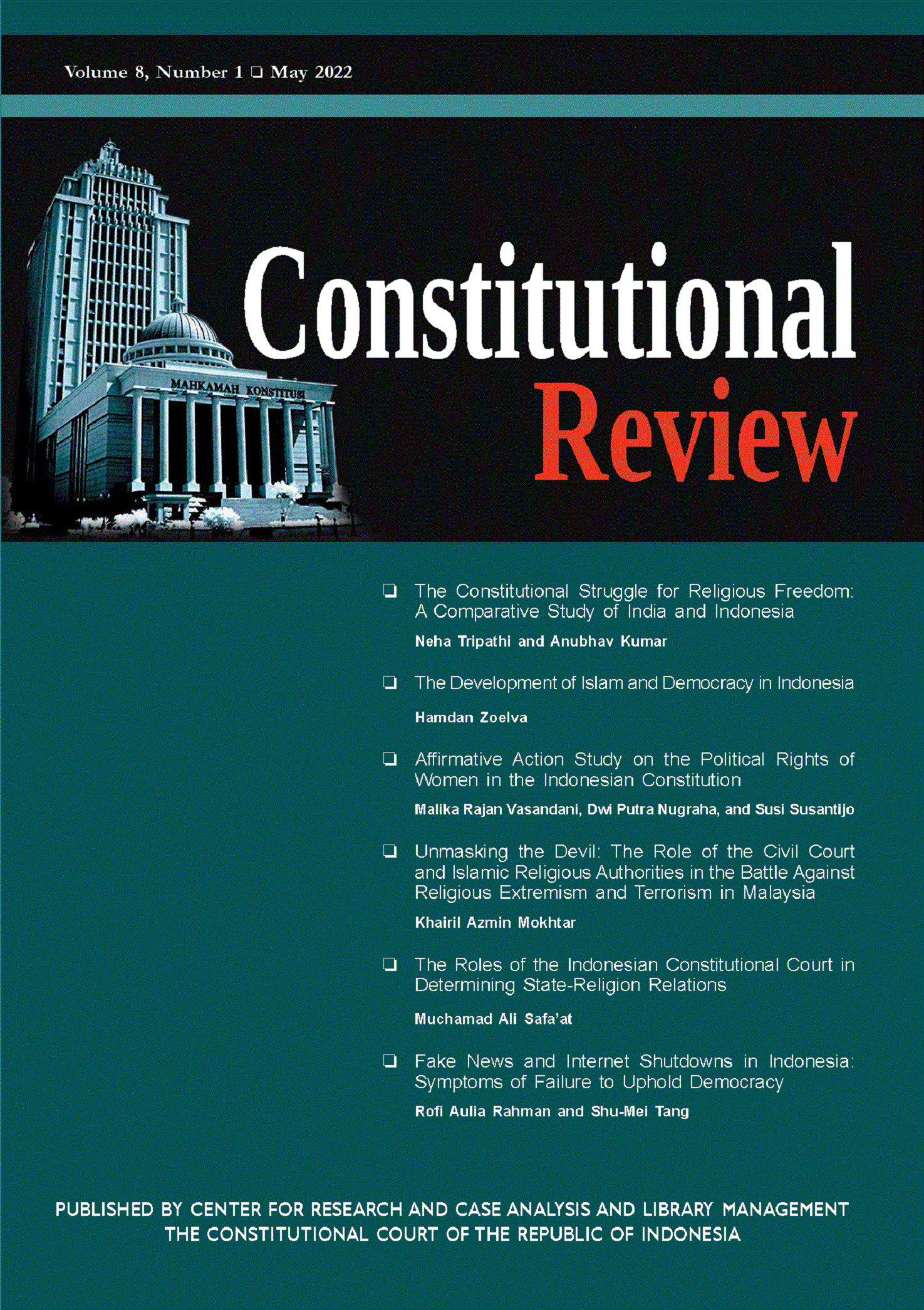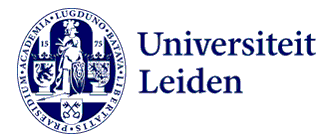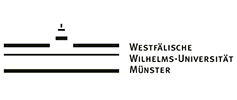The Constitutional Struggle for Religious Freedom: A Comparative Study of India and Indonesia
DOI:
https://doi.org/10.31078/consrev811Keywords:
Blasphemy, Essential Practice, Judiciary, Religion, Religious RightsAbstract
Constitutions tend to regulate the relationship between religious and state authorities. Before the rise of the modern state, it was difficult to make proper distinctions between law, religion and morality. With the emergence of Western liberalism, the concept of democracy and secularism gained newfound attention, becoming ingrained and in tune with modern constitutional frameworks. Establishing the relationship between state and religion is a thorny issue for constitution-makers. Opponents of constitutional recognition of religion view religion as a private matter, relating to personal beliefs and conscience. This paper studies the comparative constitutional frameworks of India and Indonesia in relation to the right to religious freedom. As vibrant democracies comprised of ethnically diverse populations, both India and Indonesia grapple with issues concerning religious majorities and minorities. In India, Hindus are the majority, then Muslims, Christians, Sikhs and Buddhists; whereas in Indonesia, Muslims are the majority, then Christians, Hindus and Buddhists. Both India and Indonesia have ratified the International Covenant on Civil and Political Rights. The judgments of the constitutional courts in these countries have prompted constitutional law scholars to analyze the status of constitutionally recognized freedom of religion and its enforceability. This article first studies the relationship between state and religion in the contemporary sphere, thereby engaging in a comparative study of the formation of constitutional provisions in relation to religious freedom in India and Indonesia. Second, it aims to establish the importance of religious freedom within a constitutional framework. Third, it will discuss the issues surrounding recognition and enforcement of religious freedom in India and Indonesia, as well as providing an analysis from the perspective of majoritarianism and religious intolerance. Fourth, it will analyze landmark judgments of the constitutional courts of India and Indonesia in formulating and establishing the basic tenets of religious freedoms in the two nations. The role of the judiciary and governmental institutions in dealing with issues of religious freedom remains a central question in democratic countries such as India and Indonesia. Keeping in mind the need for a more holistic study and contributing to the literature in this area, the authors will present a comparative analysis of religious freedom in both these nations for nuanced understanding of religious rights and their interplay with the respective constitutions.References
Abdulla, Mariam R. “Culture, Religion, and Freedom of Religion or Belief.” The Review of Faith & International Affairs 16, no. 4 (2018).
Abrams, Phillip (ed.). John Locke: The Two Tracts on Government. Cambridge: Cambridge University Press, 1967.
Ackerman, Bruce. Social Justice in the Liberal State. Connecticut: Yale University Press, 1980.
Ahdar, Rex and Leigh, Ian. Religious Freedom in the Liberal State. Oxford: Oxford University Press, 2013.
Ahmad, Aijaz. Lineages of the Present: Political Essays. New Delhi: Manohar Publishers and Distributors, 1996.
Ahmed, Dawood. Religion State Relations. Sweden: International IDEA Constitution-Building Primer, 2017. https://www.idea.int/sites/default/files/ publications/religion-state-relations-primer.pdf (Accessed 31.08.2021).
Andrews, Charless Freer. Mahatma Gandhi’s Ideas: Including Selections from His Writings. London: George Allen & Unwin, Ltd., 1949.
Arran, Scott. In God We Trust: The evolutionary landscape of Religion. Oxford: Oxford University Press, 2005.
Bader, Veit. “Religious Pluralism: Secularism or Priority for Democracy?” Political Theory 27, no. 5 (1999).
Bagir, Zainal Abidin. “Defamation of Religion Law in Post-Reformasi Indonesia: Is Revision Possible?” Australian Journal of Asian Law 13, no. 2 (2013).
Bailey, Tom and Valentine Gentile (ed.). Rawls and Religion. Columbia: Columbia University Press, 2014.
Bali, Asli and Hanna Lerner. “Religion and Constitution Making in Comparative Perspective.” In Handbook on Comparative Constitution Making, edited by David Landau and Hanna Lerner. Cheltenham: Edward Elgar, 2019.
Bali, Asli U. and Hanna Lerner. “Constitutional Design without a Constitutional Moment: Lessons from Religiously Divided Societies.” Cornell International Law Journal 49, no. 2 (2016).
Bhardwaj, Shrutanjaya. “Individual Religious Freedom is Subject to Other Fundamental Rights.” SCC 7, Part-4 J-29 (2019).
Bhargava, Rajeev. “The Distinctiveness of Indian Secularism.” In The Future of Secularism, edited by T.N. Srinivasan. Oxford: Oxford University Press, 2006.
Bhatia, Gautam. “Freedom from Community: Individual Rights, Group Life, State Authority and Religious Freedom under the Indian Constitution.” Global Constitutionalism 5, no. 3 (2016).
Binawan, Alexius Andang L. “Declarations and the Indonesian Constitution on Religious Freedom.” Journal of Islamic Studies 49, no. 2 (2011).
Brown, Carl L. Religion and State, The Muslim Approach to Politics. Columbia: Columbia University Press, 2000.
Bruce, Steve. “Secularisation and Politics.” In Routledge Handbook of Religion and Politics, edited by Jeffrey Haynes. London: Routledge, 2009.
Butt, Simon. “Constitutional Recognition of “Belief” in Indonesia.” Journal of Law and Religion 35, no. 3 (2020).
Chatterjee, Partha. “Secularism and Toleration.” Economic and Political Weekly
29, no. 28 (1994).
Chaves, Mark. “Secularization as Declining Religious Authority.” Social Forces
72, no. 3 (1994).
Chowdhury, Adrija Roy. “Secularism: Why Nehru dropped, and Indira inserted the S-word in the Constitution” Indian Express, December 2017. https:// indianexpress.com/article/research/anant-kumar-hegde-secularism- constitution-india-bjp-jawaharlal-nehru-indira-gandhi-5001085/.
"Constitute, the World Constitutions to Read, Search, and Compare,” available at https:// www.constituteproject.org/."
Constitution of India.
Crouch, Melissa. “Law and Religion in Indonesia: The Constitutional Court and the Blasphemy Law.” Asian Journal of Comparative Law 7, no. 1 (2012).
Dhavan, Rajeev and Nariman, Fali. “The Supreme Court and Group Life.” In Supreme but Not Infallible: Essays in Honour of the Supreme Court of India. New Delhi, edited by Bhupinder Nath Kirpal et al. Oxford University Press 2000.
Dhavan, Rajeev. “Religious Freedom in India.” American Journal of Comparative Law 35, no. 1 (1987).
Domingo, Rafael. “A Right to Religious and Moral Freedom?” I•CON 12, no. 1 (2014).
Driessen, Michael D. P. “Religion, State and Democracy: Analyzing Two Dimensions of Church-State Arrangement.” Politics and Religion 3, no. 1 (2010).
Durham, Jr., W. Cole. “Religious Freedom in a Worldwide Setting: Comparative Reflections, Universal Rights in a World of Diversity.” The Case of Religious Freedom Pontifical Academy of Social Sciences 17, (2012). Available at http:// www.pass.va/content/dam/scienzesociali/pdf/acta17/acta17-durham.pdf.
Elson, R. E. “Another Look at the Jakarta Charter Controversy of 1945.” Indonesia
no. 88 (2009): 105-130.
Fasolt, Constantin. “Separation of Church and State: The Past and Future of Sacred and Profane.” Fourth National Conference of the Historical Society, 2004. Available at http://home.uchicago.edu/~icon/written2/separation.pdf.
Founders Online, National Archives. “Minutes of University of Virginia Board of Visitors, 29 March 1819.” Available at https://founders.archives.gov/ documents/Jefferson/03-14-02-0167.
Galanter, M. “Hinduism, Secularism, and the Indian Judiciary.” Philosophy East and West 21, no. 4 (1971): 467-487.
Ghosh, Soumalya. “Supreme Court on Women’s Right to Religious Freedom in India: From Shirur Mutt to Sabarimala.” Indian Journal of Law and Justice 10, no. 1 (2019): 162-168.
Ghosh, Yashomati and Anirban Chakraborty. “Secularism, Multiculturalism and Legal Pluralism: A Comparative Analysis between the Indian and Western Constitutional Philosophy.” Asian Journal of Legal Education 7, no. 1 (2019).
Gill, Anthony. The Political Origins of Religious Liberty. Cambridge: Cambridge University Press, 2008.
Ginsburg, Tom and Rosalind Dixon. Research Handbook on Comparative Constitutional Law. Cheltenham: Edward Elgar Publishing, 2011.
Grim, Brian J. and Roger Finke. The Price of Freedom Denied: Religious Persecution and Conflict in The Twenty-First Century. Cambridge: Cambridge University Press, 2011.
Gvosdev, Nikolas K. “Constitutional Doublethink, Managed Pluralism and Freedom of Religion.” Religion, State & Society 29, no. 2 (2001).
Habermas, Jürgen. “Religion in the Public Sphere.” European Journal of Philosophy
14, no. 1 (2006).
Hamilton, Alexander, James Madison, John Jay and Clinton Rossiter. The Federalist Papers. New York: Penguin, 1961.
Hanson, Eric O. Religion and Politics in the International System Today. Cambridge: Cambridge University Press, 2006.
Haynes, Jeffrey. Handbook of Religion and Politics. Oxfordshire: Routledge, 2009.
Hefner, Robert W. “Islam and Institutional Religious Freedom in Indonesia.”
Religions 12 (2021).
Hollenbach, David. “Public Reason/Private Religion? A Response to Paul J. Weithman.” The Journal of Religious Ethics 22, no. 1 (1994).
Hollenbach, David. The Global Face of Public Faith. Georgetown: Georgetown University Press, 2003.
Hosen, Nadirsyah. “Religion and the Indonesian Constitution: A Recent Debate.”
Journal of Southeast Asian Studies 36, no. 3 (2005).
Hyung-Jun, Kim. “The Changing Interpretation of Religious Freedom in Indonesia.”
Journal of Southeast Asian Studies 29, no. 2 (1998).
Ibrahim, Nur Amali, “The Law and Religious Intolerance in Indonesia,” 2019. https://blog.bakerinstitute.org/2019/08/23/the-law-and-religious-intolerance- in-indonesia/.
Jacobson, G J. “Constitutional Identity.” The review of Politics 68, no. 3 (2006).
Jacobson, Gary Jeffrey. The Wheel of Law: India’s Secularism in Comparative Constitutional Context. Princeton: Princeton University Press, 2003.
Jereza, Veronica Louise B. “Many Identities, Many Communities: Religious Freedom amidst Religious Diversity in Southeast Asia.” The Review of Faith & International Affairs 14, no. 4 (2016).
Jha, Shefali. “Secularism in the Constituent Assembly Debates.” Economic and Political Weekly 37 (2002).
Khaitan, Tarunabh. A Theory of Discrimination Law. Oxford: Oxford University Press, 2015.
Krishnaswami, Arcot. “Study of Discrimination in the Matter of Religious Rights and Practices.” Special Rapporteur of the Sub-Commission on Prevention of Discrimination and Protection of Minorities, 1960). Available at https:// www.ohchr.org/documents/issues/religion/krishnaswami_1960.pdf.
Kurland, Philip B. “The Origins of the Religion Clauses of the Constitution.”
William and Mary Law Review 27 (1986).
Leiter, Brian. Why Tolerate Religion? Princeton: Princeton University Press, 2012.
Library of Congress. “Indonesia: Constitutional Court Opens Way to Recognition of Native Faith. Published November 17, 2017. Available at https://www.loc. gov/item/global-legal-monitor/2017-11-17/indonesia-constitutional-court- opens-way-to-recognition-of-native-faiths/.
Maula, Bani Syarif. “Religious Freedom in Indonesia, Between Upholding Constitutional Provisions and Complying with Social Considerations.” Journal of Indonesian Islam 7, no. 2 (2013).
McConnell, Michael W. “Why Protect Religious Freedom?” The Yale Law Journal
123, no. 3 (2012-13).
Milton, John. 1644. Areopagitica. Cheltenham: AMG Press, 1966.
Morfit, Michael. “Pancasila: The Indonesian State Ideology According to the New Order Government.” Asian Survey, 21, no. 8 (1981).
Moyser, George (ed.). Politics and Religion in the Modern World. London: Routledge, 1991.
Mustafa, Faizan and Jagteshwar Singh Sohi. “Freedom of Religion in India: Current Issues and Supreme Court Acting as Clergy.” Bringham Young University Law Review (2017).
Neo, Jaclyn, Jamal Arif, Daniel Goh, et. al. Regulating Religion in Asia: Norms, Modes, and Challenges. Cambridge: Cambridge University Press, 2019.
Nieuwenhuis, Aernout J. “State and Religion, a Multidimensional Relationship: Some Comparative Law Remarks.” International Journal of Constitutional Law 10, no. 1 (2012): 153-174.
Osman, Mohamed Nawab Mohamed, and Prashant Waikar. “Fear and Loathing: Uncivil Islamism and Indonesia’s Anti-Ahok Movement.” Indonesia 106 (2018).
Parthasarathy, Suhrith. “An Equal Right to Freedom of Religion: A Reading of the Supreme Court’s Judgment in the Sabarimala Case.” University of Oxford Human Rights Hub Journal 3, no. 2 (2020).
Patrocinio de Souza, J. “The Freedom of Religion under the Indian Constitution.”
The Indian Journal of Political Science 13, no. 3/4 (1952).
Peterson, Daniel. Islam, Blasphemy, and Human Rights in Indonesia: The Trial of Ahok. Oxfordshire: Routledge, 2020.
Plant, Raymond. Politics, Theology and History. Cambridge: Cambridge University Press, 2001.
Rao, B P. “Matters of Religion.” Journal of the Indian Law Institute 5, no. 4 (1963).
Reed, Ananya Mukherjee. “Religious Freedom Versus Gender Equity in Contemporary India: What Constitutions Can and Cannot Do.” Atlantis 25, no. 2 (2001).
Rieffer, Barbara Ann. “Religion, Politics and Human Rights: Understanding the Role of Christianity in the Promotion of Human Rights.” Human Rights and Human Welfare 6, no. 1 (2006).
Rist, John M. Augustine: Ancient Thought Baptised. Cambridge: Cambridge University Press, 1994.
Salim, Arskal. “Muslim Politics in Indonesia’s Democratization: The Religious Majority and the Rights of Minorities in the Post-New Order Era.” In Indonesia: Democracy and the Promise of Good Governance, edited by Ross
H. McLeod and Andrew MacIntyre. Singapore: ISEAS, 2007.
Sathe, S.P. Secularism, Law and the Constitution of India. Pune: Pune Indian Secular Society, 1991.
Seervai, H.M. Constitutional Law of India. New Delhi: Universal Law Publishing, 1993.
Sen, Amartya. Identity and Violence: The Illusion of Destiny. New York: WW Norton & Co., 2006.
Shah, Dian A H. Constitutions, Religion and Politics in Asia, Indonesia, Malaysia and Sri Lanka. Cambridge: Cambridge University Press, 2017.
Sharma, Rajendra K. Indian Society, Institutions and Change. New Delhi: Atlantic Publishers and Distributors, 2004.
Sigmund, Paul E. “A Letter Concerning Toleration” in The Selected Political Writings of John Locke. New York: W.W. Norton & Company, 2005.
Singh, Ranbir and Karamvir Singh, Karamvir. “Secularism in India: Challenges and Its Future.” Indian Journal of Political Science 69 (2008).
Smith, Donald Eugene. India as a Secular State. New Jersey: Princeton University Press; Bombay: Oxford University Press, 1963.
Smith, Steven D. “The Rise and Fall of Religious Freedom in Constitutional Discourse.” University of Pennsylvania Law Review, 140 (1991).
Stahnke, Tad and Blitt, Robert C. “The Religion-State Relationship and the Right to Freedom of Religion or Belief: A Comparative Textual Analysis of the Constitution of Predominantly Muslim Countries.” Georgetown Journal of International Law, 36 (2005).
Tyson, Adam. “Blasphemy and Judicial Legitimacy in Indonesia, Religion and Politics.” Section of the American Political Science Association, Politics and Religion (2020).
“Thomas Jefferson: Virginia Board of Visitors Minutes.” (1819). Available at https:// www.govtrack.us/congress/bills/114/hconres108/text.
“The Tandem Project, United Nations, Human Rights & Freedom of Religion or Belief,” 2008, retrieved from http://www.tandemproject.com/issue_ statements/statements/2008/072408_upr_files/072408_upr.pdf
Wallis, Wilson Dallam. “Durkheim’s View of Religion.” Journal of Religious Psychology, 7, no. 2 (1914).
Walzer, Michael. “Liberalism and the Art of Separation.” Political Theory 12, no.
3(1984).
Weithman, Paul J. Religion and the Obligations of Citizenship. Cambridge: Cambridge University Press, 2002.
Williams, Coleman D. Freedom of Religion and The Indian Supreme Court: The Religious Denomination and Essential Practices Tests. Thesis, University of Hawai'i at Manoa, 2019.
Wood, James Jr. “Religious Human Rights and a Democratic State.” Journal of Church and State 46, no. 4 (2004).
Abrams, Phillip (ed.). John Locke: The Two Tracts on Government. Cambridge: Cambridge University Press, 1967.
Ackerman, Bruce. Social Justice in the Liberal State. Connecticut: Yale University Press, 1980.
Ahdar, Rex and Leigh, Ian. Religious Freedom in the Liberal State. Oxford: Oxford University Press, 2013.
Ahmad, Aijaz. Lineages of the Present: Political Essays. New Delhi: Manohar Publishers and Distributors, 1996.
Ahmed, Dawood. Religion State Relations. Sweden: International IDEA Constitution-Building Primer, 2017. https://www.idea.int/sites/default/files/ publications/religion-state-relations-primer.pdf (Accessed 31.08.2021).
Andrews, Charless Freer. Mahatma Gandhi’s Ideas: Including Selections from His Writings. London: George Allen & Unwin, Ltd., 1949.
Arran, Scott. In God We Trust: The evolutionary landscape of Religion. Oxford: Oxford University Press, 2005.
Bader, Veit. “Religious Pluralism: Secularism or Priority for Democracy?” Political Theory 27, no. 5 (1999).
Bagir, Zainal Abidin. “Defamation of Religion Law in Post-Reformasi Indonesia: Is Revision Possible?” Australian Journal of Asian Law 13, no. 2 (2013).
Bailey, Tom and Valentine Gentile (ed.). Rawls and Religion. Columbia: Columbia University Press, 2014.
Bali, Asli and Hanna Lerner. “Religion and Constitution Making in Comparative Perspective.” In Handbook on Comparative Constitution Making, edited by David Landau and Hanna Lerner. Cheltenham: Edward Elgar, 2019.
Bali, Asli U. and Hanna Lerner. “Constitutional Design without a Constitutional Moment: Lessons from Religiously Divided Societies.” Cornell International Law Journal 49, no. 2 (2016).
Bhardwaj, Shrutanjaya. “Individual Religious Freedom is Subject to Other Fundamental Rights.” SCC 7, Part-4 J-29 (2019).
Bhargava, Rajeev. “The Distinctiveness of Indian Secularism.” In The Future of Secularism, edited by T.N. Srinivasan. Oxford: Oxford University Press, 2006.
Bhatia, Gautam. “Freedom from Community: Individual Rights, Group Life, State Authority and Religious Freedom under the Indian Constitution.” Global Constitutionalism 5, no. 3 (2016).
Binawan, Alexius Andang L. “Declarations and the Indonesian Constitution on Religious Freedom.” Journal of Islamic Studies 49, no. 2 (2011).
Brown, Carl L. Religion and State, The Muslim Approach to Politics. Columbia: Columbia University Press, 2000.
Bruce, Steve. “Secularisation and Politics.” In Routledge Handbook of Religion and Politics, edited by Jeffrey Haynes. London: Routledge, 2009.
Butt, Simon. “Constitutional Recognition of “Belief” in Indonesia.” Journal of Law and Religion 35, no. 3 (2020).
Chatterjee, Partha. “Secularism and Toleration.” Economic and Political Weekly
29, no. 28 (1994).
Chaves, Mark. “Secularization as Declining Religious Authority.” Social Forces
72, no. 3 (1994).
Chowdhury, Adrija Roy. “Secularism: Why Nehru dropped, and Indira inserted the S-word in the Constitution” Indian Express, December 2017. https:// indianexpress.com/article/research/anant-kumar-hegde-secularism- constitution-india-bjp-jawaharlal-nehru-indira-gandhi-5001085/.
"Constitute, the World Constitutions to Read, Search, and Compare,” available at https:// www.constituteproject.org/."
Constitution of India.
Crouch, Melissa. “Law and Religion in Indonesia: The Constitutional Court and the Blasphemy Law.” Asian Journal of Comparative Law 7, no. 1 (2012).
Dhavan, Rajeev and Nariman, Fali. “The Supreme Court and Group Life.” In Supreme but Not Infallible: Essays in Honour of the Supreme Court of India. New Delhi, edited by Bhupinder Nath Kirpal et al. Oxford University Press 2000.
Dhavan, Rajeev. “Religious Freedom in India.” American Journal of Comparative Law 35, no. 1 (1987).
Domingo, Rafael. “A Right to Religious and Moral Freedom?” I•CON 12, no. 1 (2014).
Driessen, Michael D. P. “Religion, State and Democracy: Analyzing Two Dimensions of Church-State Arrangement.” Politics and Religion 3, no. 1 (2010).
Durham, Jr., W. Cole. “Religious Freedom in a Worldwide Setting: Comparative Reflections, Universal Rights in a World of Diversity.” The Case of Religious Freedom Pontifical Academy of Social Sciences 17, (2012). Available at http:// www.pass.va/content/dam/scienzesociali/pdf/acta17/acta17-durham.pdf.
Elson, R. E. “Another Look at the Jakarta Charter Controversy of 1945.” Indonesia
no. 88 (2009): 105-130.
Fasolt, Constantin. “Separation of Church and State: The Past and Future of Sacred and Profane.” Fourth National Conference of the Historical Society, 2004. Available at http://home.uchicago.edu/~icon/written2/separation.pdf.
Founders Online, National Archives. “Minutes of University of Virginia Board of Visitors, 29 March 1819.” Available at https://founders.archives.gov/ documents/Jefferson/03-14-02-0167.
Galanter, M. “Hinduism, Secularism, and the Indian Judiciary.” Philosophy East and West 21, no. 4 (1971): 467-487.
Ghosh, Soumalya. “Supreme Court on Women’s Right to Religious Freedom in India: From Shirur Mutt to Sabarimala.” Indian Journal of Law and Justice 10, no. 1 (2019): 162-168.
Ghosh, Yashomati and Anirban Chakraborty. “Secularism, Multiculturalism and Legal Pluralism: A Comparative Analysis between the Indian and Western Constitutional Philosophy.” Asian Journal of Legal Education 7, no. 1 (2019).
Gill, Anthony. The Political Origins of Religious Liberty. Cambridge: Cambridge University Press, 2008.
Ginsburg, Tom and Rosalind Dixon. Research Handbook on Comparative Constitutional Law. Cheltenham: Edward Elgar Publishing, 2011.
Grim, Brian J. and Roger Finke. The Price of Freedom Denied: Religious Persecution and Conflict in The Twenty-First Century. Cambridge: Cambridge University Press, 2011.
Gvosdev, Nikolas K. “Constitutional Doublethink, Managed Pluralism and Freedom of Religion.” Religion, State & Society 29, no. 2 (2001).
Habermas, Jürgen. “Religion in the Public Sphere.” European Journal of Philosophy
14, no. 1 (2006).
Hamilton, Alexander, James Madison, John Jay and Clinton Rossiter. The Federalist Papers. New York: Penguin, 1961.
Hanson, Eric O. Religion and Politics in the International System Today. Cambridge: Cambridge University Press, 2006.
Haynes, Jeffrey. Handbook of Religion and Politics. Oxfordshire: Routledge, 2009.
Hefner, Robert W. “Islam and Institutional Religious Freedom in Indonesia.”
Religions 12 (2021).
Hollenbach, David. “Public Reason/Private Religion? A Response to Paul J. Weithman.” The Journal of Religious Ethics 22, no. 1 (1994).
Hollenbach, David. The Global Face of Public Faith. Georgetown: Georgetown University Press, 2003.
Hosen, Nadirsyah. “Religion and the Indonesian Constitution: A Recent Debate.”
Journal of Southeast Asian Studies 36, no. 3 (2005).
Hyung-Jun, Kim. “The Changing Interpretation of Religious Freedom in Indonesia.”
Journal of Southeast Asian Studies 29, no. 2 (1998).
Ibrahim, Nur Amali, “The Law and Religious Intolerance in Indonesia,” 2019. https://blog.bakerinstitute.org/2019/08/23/the-law-and-religious-intolerance- in-indonesia/.
Jacobson, G J. “Constitutional Identity.” The review of Politics 68, no. 3 (2006).
Jacobson, Gary Jeffrey. The Wheel of Law: India’s Secularism in Comparative Constitutional Context. Princeton: Princeton University Press, 2003.
Jereza, Veronica Louise B. “Many Identities, Many Communities: Religious Freedom amidst Religious Diversity in Southeast Asia.” The Review of Faith & International Affairs 14, no. 4 (2016).
Jha, Shefali. “Secularism in the Constituent Assembly Debates.” Economic and Political Weekly 37 (2002).
Khaitan, Tarunabh. A Theory of Discrimination Law. Oxford: Oxford University Press, 2015.
Krishnaswami, Arcot. “Study of Discrimination in the Matter of Religious Rights and Practices.” Special Rapporteur of the Sub-Commission on Prevention of Discrimination and Protection of Minorities, 1960). Available at https:// www.ohchr.org/documents/issues/religion/krishnaswami_1960.pdf.
Kurland, Philip B. “The Origins of the Religion Clauses of the Constitution.”
William and Mary Law Review 27 (1986).
Leiter, Brian. Why Tolerate Religion? Princeton: Princeton University Press, 2012.
Library of Congress. “Indonesia: Constitutional Court Opens Way to Recognition of Native Faith. Published November 17, 2017. Available at https://www.loc. gov/item/global-legal-monitor/2017-11-17/indonesia-constitutional-court- opens-way-to-recognition-of-native-faiths/.
Maula, Bani Syarif. “Religious Freedom in Indonesia, Between Upholding Constitutional Provisions and Complying with Social Considerations.” Journal of Indonesian Islam 7, no. 2 (2013).
McConnell, Michael W. “Why Protect Religious Freedom?” The Yale Law Journal
123, no. 3 (2012-13).
Milton, John. 1644. Areopagitica. Cheltenham: AMG Press, 1966.
Morfit, Michael. “Pancasila: The Indonesian State Ideology According to the New Order Government.” Asian Survey, 21, no. 8 (1981).
Moyser, George (ed.). Politics and Religion in the Modern World. London: Routledge, 1991.
Mustafa, Faizan and Jagteshwar Singh Sohi. “Freedom of Religion in India: Current Issues and Supreme Court Acting as Clergy.” Bringham Young University Law Review (2017).
Neo, Jaclyn, Jamal Arif, Daniel Goh, et. al. Regulating Religion in Asia: Norms, Modes, and Challenges. Cambridge: Cambridge University Press, 2019.
Nieuwenhuis, Aernout J. “State and Religion, a Multidimensional Relationship: Some Comparative Law Remarks.” International Journal of Constitutional Law 10, no. 1 (2012): 153-174.
Osman, Mohamed Nawab Mohamed, and Prashant Waikar. “Fear and Loathing: Uncivil Islamism and Indonesia’s Anti-Ahok Movement.” Indonesia 106 (2018).
Parthasarathy, Suhrith. “An Equal Right to Freedom of Religion: A Reading of the Supreme Court’s Judgment in the Sabarimala Case.” University of Oxford Human Rights Hub Journal 3, no. 2 (2020).
Patrocinio de Souza, J. “The Freedom of Religion under the Indian Constitution.”
The Indian Journal of Political Science 13, no. 3/4 (1952).
Peterson, Daniel. Islam, Blasphemy, and Human Rights in Indonesia: The Trial of Ahok. Oxfordshire: Routledge, 2020.
Plant, Raymond. Politics, Theology and History. Cambridge: Cambridge University Press, 2001.
Rao, B P. “Matters of Religion.” Journal of the Indian Law Institute 5, no. 4 (1963).
Reed, Ananya Mukherjee. “Religious Freedom Versus Gender Equity in Contemporary India: What Constitutions Can and Cannot Do.” Atlantis 25, no. 2 (2001).
Rieffer, Barbara Ann. “Religion, Politics and Human Rights: Understanding the Role of Christianity in the Promotion of Human Rights.” Human Rights and Human Welfare 6, no. 1 (2006).
Rist, John M. Augustine: Ancient Thought Baptised. Cambridge: Cambridge University Press, 1994.
Salim, Arskal. “Muslim Politics in Indonesia’s Democratization: The Religious Majority and the Rights of Minorities in the Post-New Order Era.” In Indonesia: Democracy and the Promise of Good Governance, edited by Ross
H. McLeod and Andrew MacIntyre. Singapore: ISEAS, 2007.
Sathe, S.P. Secularism, Law and the Constitution of India. Pune: Pune Indian Secular Society, 1991.
Seervai, H.M. Constitutional Law of India. New Delhi: Universal Law Publishing, 1993.
Sen, Amartya. Identity and Violence: The Illusion of Destiny. New York: WW Norton & Co., 2006.
Shah, Dian A H. Constitutions, Religion and Politics in Asia, Indonesia, Malaysia and Sri Lanka. Cambridge: Cambridge University Press, 2017.
Sharma, Rajendra K. Indian Society, Institutions and Change. New Delhi: Atlantic Publishers and Distributors, 2004.
Sigmund, Paul E. “A Letter Concerning Toleration” in The Selected Political Writings of John Locke. New York: W.W. Norton & Company, 2005.
Singh, Ranbir and Karamvir Singh, Karamvir. “Secularism in India: Challenges and Its Future.” Indian Journal of Political Science 69 (2008).
Smith, Donald Eugene. India as a Secular State. New Jersey: Princeton University Press; Bombay: Oxford University Press, 1963.
Smith, Steven D. “The Rise and Fall of Religious Freedom in Constitutional Discourse.” University of Pennsylvania Law Review, 140 (1991).
Stahnke, Tad and Blitt, Robert C. “The Religion-State Relationship and the Right to Freedom of Religion or Belief: A Comparative Textual Analysis of the Constitution of Predominantly Muslim Countries.” Georgetown Journal of International Law, 36 (2005).
Tyson, Adam. “Blasphemy and Judicial Legitimacy in Indonesia, Religion and Politics.” Section of the American Political Science Association, Politics and Religion (2020).
“Thomas Jefferson: Virginia Board of Visitors Minutes.” (1819). Available at https:// www.govtrack.us/congress/bills/114/hconres108/text.
“The Tandem Project, United Nations, Human Rights & Freedom of Religion or Belief,” 2008, retrieved from http://www.tandemproject.com/issue_ statements/statements/2008/072408_upr_files/072408_upr.pdf
Wallis, Wilson Dallam. “Durkheim’s View of Religion.” Journal of Religious Psychology, 7, no. 2 (1914).
Walzer, Michael. “Liberalism and the Art of Separation.” Political Theory 12, no.
3(1984).
Weithman, Paul J. Religion and the Obligations of Citizenship. Cambridge: Cambridge University Press, 2002.
Williams, Coleman D. Freedom of Religion and The Indian Supreme Court: The Religious Denomination and Essential Practices Tests. Thesis, University of Hawai'i at Manoa, 2019.
Wood, James Jr. “Religious Human Rights and a Democratic State.” Journal of Church and State 46, no. 4 (2004).
Downloads
Published
2022-05-31
How to Cite
Tripathi, N., & Kumar, A. (2022). The Constitutional Struggle for Religious Freedom: A Comparative Study of India and Indonesia. Constitutional Review, 8(1), 1–36. https://doi.org/10.31078/consrev811
Issue
Section
Articles
































































